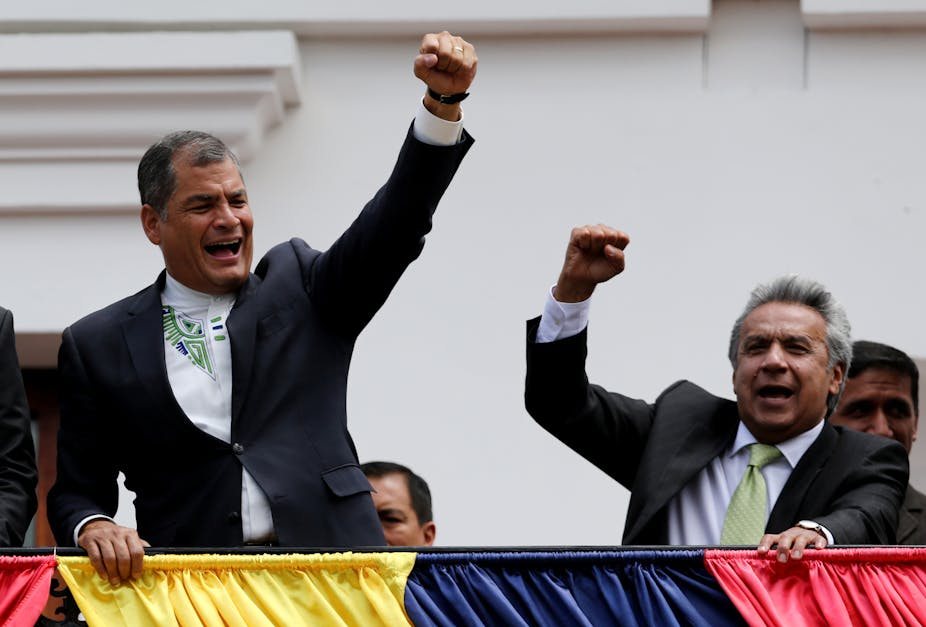After 10 years in power, Ecuador’s President Rafael Correa will step down.
However, political power isn’t falling far from the tree. Correa’s hand-picked successor and former vice president, Lenin Moreno, has declared victory against liberal banker Guillermo Lasso. The election has calmed fears that Correa might attempt to cling to the office after he changed the constitution in 2015 to allow for his permanent reelection.
However, Moreno’s election lacks legitimacy for about half of the electorate amid allegations of electoral fraud. To make matters worse, he won in an unfair electoral field. Correa and his party, Alianza País, used their power as elected officials to campaign for Moreno. State-controlled media blatantly favored Moreno. His party intimidated the opposition and even used thugs to attack Lasso.
They branded Lasso as a corrupt banker who would roll back social policies designed to reduce inequality and bring back the free-market past. He was portrayed as an enemy of the common people, and as a representative of the Latin American right that aimed to reverse social policies that benefited the poor. Correa constructed the election as a vote on the legacies of his administration, and more broadly on the sustainability of a political “left turn” in Latin America.
Other recent elections show evidence of a shift to the right in Latin American politics. For example, the election of President Mauricio Macri in Argentina, the transfer of power to Michel Temer in Brazil and the election of Pedro Pablo Kuczynski in Peru.
Lasso was supported by right- and left-wing parties and some social movement leaders who were the victims of Correa’s administration. For Lasso’s supporters, the contest was between Correa’s autocracy and the promise of the liberalization and democratization of Ecuador.
Rafael Correa’s populism
Correa was first elected in 2006 after running against Ecuador’s political and economic establishment. To reverse privatization and shrinking of the state, he strengthened the state and used it to reduce poverty and inequality.

Word Bank data show that the number of people living under the national poverty line in Ecuador was reduced from 37.6 percent in 2006 to 23.3 percent in 2015.
Alianza País wanted to rule until they achieved their long-term project of revamping all political institutions. They wanted to transform the nation’s model of political and economic development from what they saw as a bourgeois democracy into a real democracy with equity and social justice. Correa claimed to be the leader of a “citizens’ revolution” tasked with bringing Ecuador to its second and definitive independence from foreign domination and anti-national elites.
Like Venezuela’s Hugo Chávez and other populists, Correa saw the people as a homogeneous entity with one interest and will embodied under his leadership. For example, after wining the 2009 election he asserted that “Ecuador voted for itself.” Correa believed he was the only voice of the people. He branded his rivals as enemies of the nation and his citizens’ revolution. Dissent even within his left-wing coalition was interpreted as treason, and Correa used discretion in enforcing laws to intimidate and repress independent social movements and his left-wing critics.
But Correa’s state-centered model of development fell into jeopardy. The price of oil, which accounts for 58 percent of Ecuador’s exports, collapsed. Ecuador developed a bloated bureaucracy and began overspending without saving for times of economic scarcity. He faced massive demonstrations against his intention to indefinitely remain in power. In 2016, Correa announced he would temporarily step down from politics, named Moreno as his successor and promised to come back in 2021.
The end of ‘correismo’?
Lenin Moreno will inherit institutions designed for autocratic control of the public sphere and civil society. His party controls the congress, the judiciary, the electoral council and all institutions of accountability like the comptroller and the ombudsman.
Correa took over media outlets and formed a state media emporium. He regulated and closed NGOs, and formed loyal social movements.
But Moreno lacks Correa’s charisma. In my opinion, he will have difficulty controlling the different factions of Alianza País made up of left-wing activists, technocrats, businesspeople and traditional politicians. This is especially true since Correa might actually encourage clashes within the coalition to set himself up as the ultimate deal maker. He might try to dictate to Moreno how to govern. Yet, it is uncertain that Moreno would become his puppet, and quite likely he would have his own agenda and ambitions that could clash with his mentor’s.
Moreno may also face an opposition emboldened by the tight race and allegations of electoral fraud. Perhaps he’ll follow the example of Venezuelan President Nicolás Maduro, the handpicked successor to Hugo Chávez. In the absence of Chavez’s charisma, Maduro has turned to an autocratic approach to silence critics. He has jailed members of the opposition and repressed protests. Venezuela is now in crisis.
Moreno will also confront increasing resistance to natural resource extraction from indigenous people, increasing protests against corruption and his election.
The Ecuadorian elections show the perils of populist succession. In order to win, Correa and Moreno used the state and the media, and packed cronies in the electoral council. Even though Moreno won, he lacks legitimacy. Accusations of fraud will haunt his administration.

